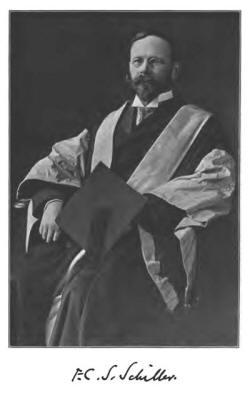

Queer Places:
Cornell University (Ivy League), 410 Thurston Ave, Ithaca, NY 14850
Rugby School, Lawrence Sheriff St, Rugby CV22 5EH
University of Oxford, Oxford, Oxfordshire OX1 3PA
 Ferdinand Canning Scott Schiller (16 August 1864 – 6 August 1937), usually cited as F. C. S. Schiller, was a German-British philosopher.
Goldsworthy Lowes
Dickinson had a satisfactory succession of young friends:
Roger Fry,
Ferdinand Schiller,
Oscar Eckhard,
Peter Savary, and others. One of his friends
writes that "each of us did his best in hi own way to assuage Goldie's
physical desires. His relationship with each ripened, after the passion had
subsided, into a lasting friendship." At the time of the
Oscar Wilde trials Ferdinand
Schiller wrote a letter to his beloved Goldsworthy Lowes Dickinson, beginning:
‘My … (mustn’t use the words since the Oscar Wilde trial).’
Ferdinand Canning Scott Schiller (16 August 1864 – 6 August 1937), usually cited as F. C. S. Schiller, was a German-British philosopher.
Goldsworthy Lowes
Dickinson had a satisfactory succession of young friends:
Roger Fry,
Ferdinand Schiller,
Oscar Eckhard,
Peter Savary, and others. One of his friends
writes that "each of us did his best in hi own way to assuage Goldie's
physical desires. His relationship with each ripened, after the passion had
subsided, into a lasting friendship." At the time of the
Oscar Wilde trials Ferdinand
Schiller wrote a letter to his beloved Goldsworthy Lowes Dickinson, beginning:
‘My … (mustn’t use the words since the Oscar Wilde trial).’
Born in Altona, Holstein (at that time member of the German Confederation, but under Danish administration), Schiller studied at the University of Oxford, later was a professor there, after being invited back after a brief time at Cornell University. Later in his life he taught at the University of Southern California. In his lifetime he was well known as a philosopher; after his death his work was largely forgotten. Schiller's philosophy was very similar to and often aligned with the pragmatism of William James, although Schiller referred to it as "humanism". He argued vigorously against both logical positivism and associated philosophers (for example, Bertrand Russell) as well as absolute idealism (such as F. H. Bradley). Schiller was an early supporter of evolution and a founding member of the English Eugenics Society.
Born in 1864, one of three brothers and the son of Ferdinand Schiller (a Calcutta merchant), Schiller's family home was in Switzerland. Schiller grew up in Rugby. He was educated at Rugby School and Balliol College, and graduated in the first class of Literae Humaniores, winning later the Taylorian scholarship for German in 1887. Schiller's first book, Riddles of the Sphinx (1891), was an immediate success despite his use of a pseudonym because of his fears concerning how the book would be received. Between the years 1893 and 1897 he was an instructor in philosophy at Cornell University. In 1897 he returned to Oxford and became fellow and tutor of Corpus Christi for more than thirty years. Schiller was president of the Aristotelian Society in 1921, and was for many years treasurer of the Mind Association. In 1926 he was elected a fellow of the British Academy. In 1929 he was appointed visiting professor in the University of Southern California, and spent half of each year in the United States and half in England. Schiller died in Los Angeles either 6, 7 or 9 August 1937 after a long and lingering illness.[2][3] Schiller was a founding member of the English Eugenics Society and published three books on the subject; Tantalus or the Future of Man (1924), Eugenics and Politics (1926), and Social Decay and Eugenic Reform (1932).[4]
My published books: